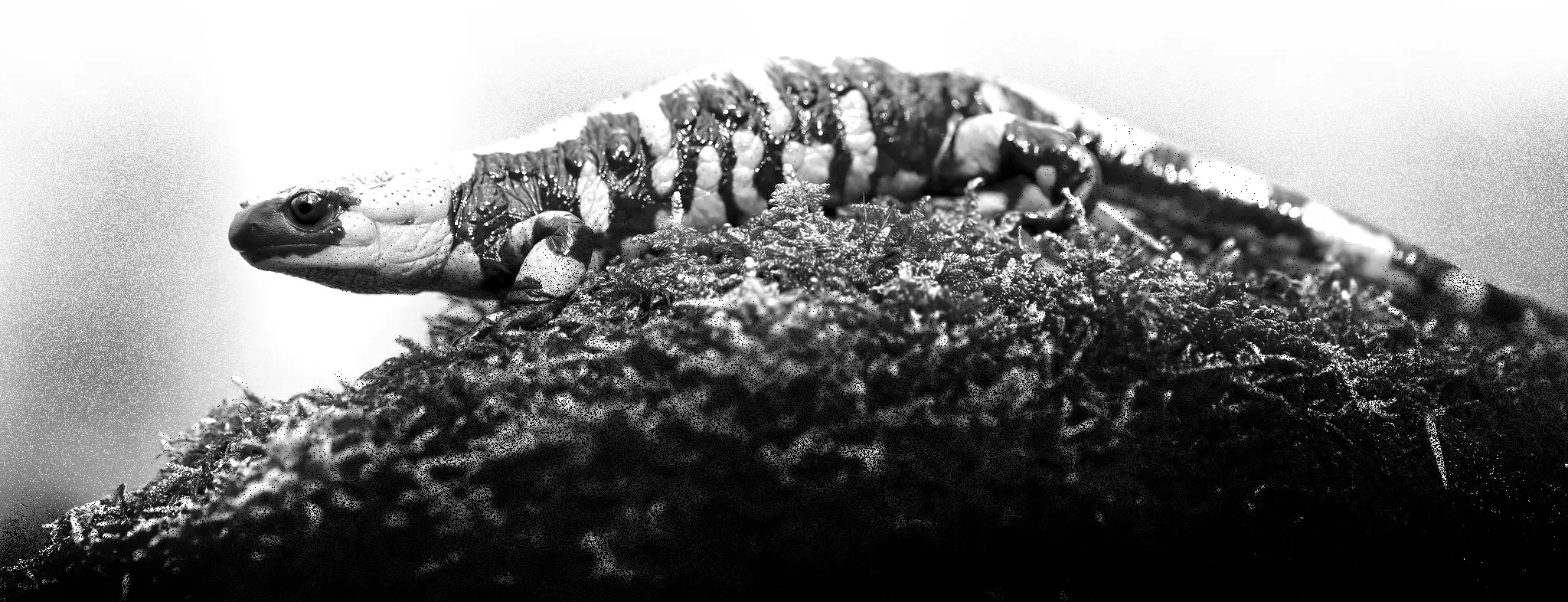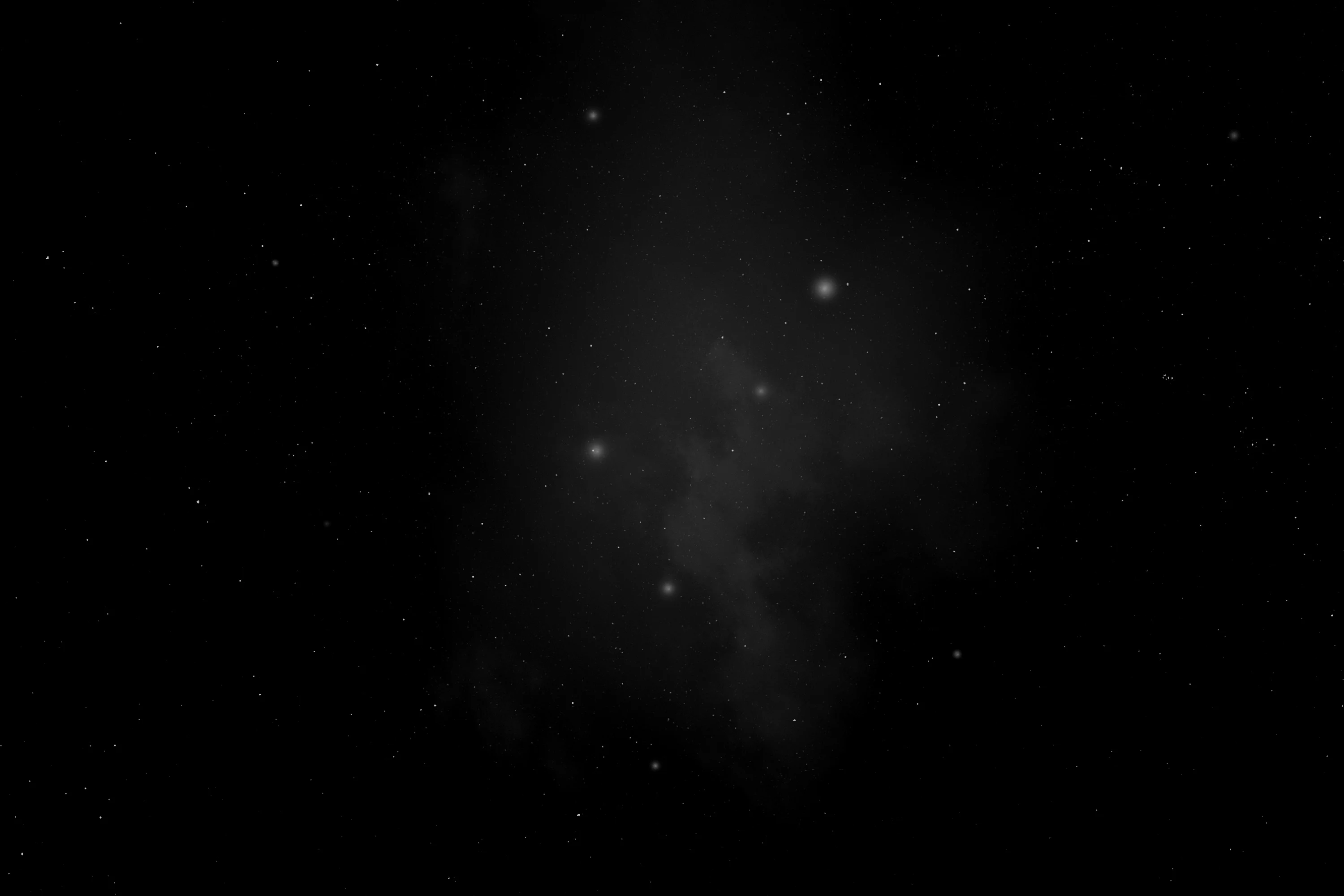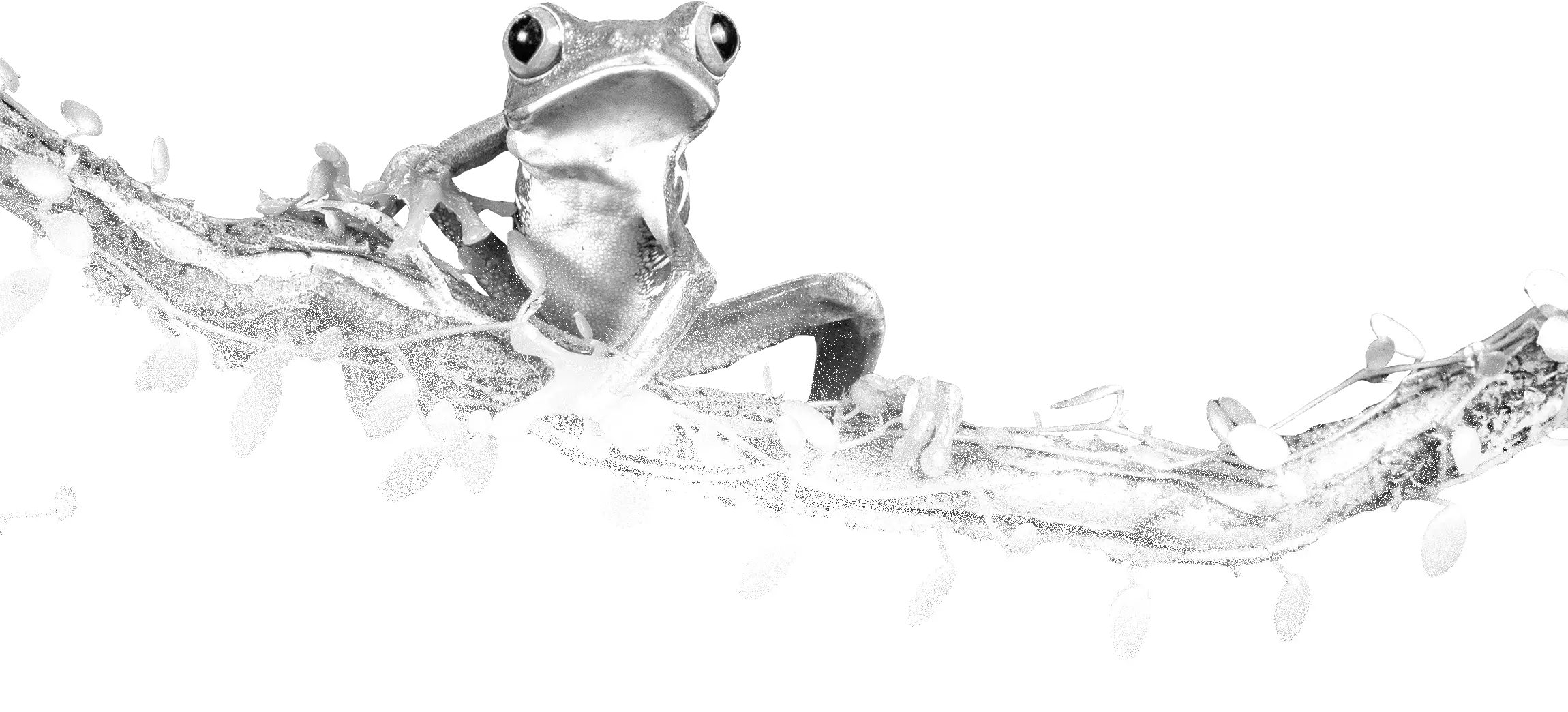
(Ichthyophiidae)
Fish Caecilians
Рибозмії
The Ichthyophiidae are the family of Asiatic tailed caecilians or fish caecilians found in South and Southeast Asia as well as southernmost China.
Description
In some species, the body length reaches up to 50 cm. They are primitive caecilians, lacking many of the derived characters found in the other families. For example, their mouths are not recessed underneath their heads, they possess tails, and they have numerous scales on their bodies. However, they have two sets of muscles for closing the jaw, a feature unique to caecilians, but absent in the related family Rhinatrematidae.
Behaviour
Adults live along riverbanks, burrowing in the soil at depths of up to half a meter, and quickly perish if they enter the water. Its diet consists of blind snakes, shield-tailed snakes, and earthworms.
Reproduction
Female lays their eggs in cavities in moist soil, where they hatch into larvae that seek out streams or underground seepages, before metamorphosing into adults. To protect the clutch from damage and desiccation, the female coils around the eggs and coats them with skin secretions. The larvae develop three pairs of feathery external gills and a lateral line organ while still inside the eggs. These structures, along with the small hind-limb buds, disappear by the time of hatching.
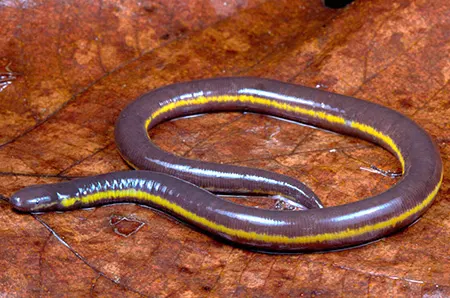
(Ichthyophis asplenius)
Broad-Striped Caecilian
Рибозмій широкосмугий
It is found in Malaysia and possibly Thailand. It is only known with certainty from Mahakam River and Matang Hunting Reserve Its natural habitats are subtropical or tropical moist lowland forests, rivers, intermittent rivers, plantations, rural gardens, heavily degraded former forest, irrigated land, and seasonally flooded agricultural land.
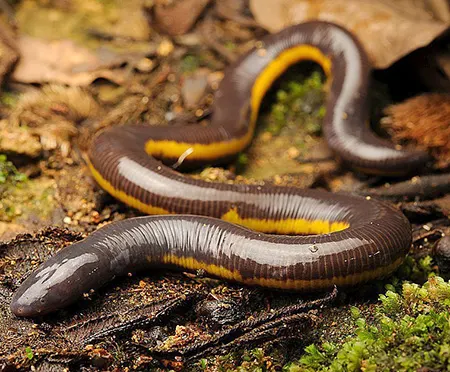
(Ichthyophis atricollaris)
Long Bloee Caecilian
It is endemic to Sarawak, Borneo (Malaysia), and only known from its imprecise type locality, “Long Bloee, Boven Mahakkam, Borneo”. It inhabits tropical rainforest and have subterranean life style.
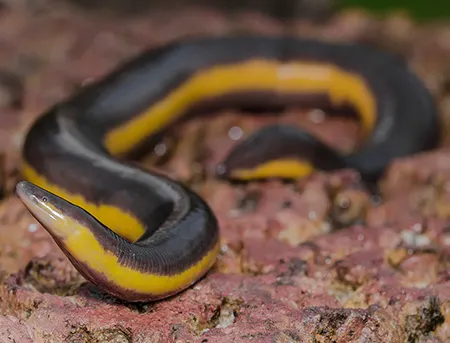
(Ichthyophis beddomei)
Beddome's Caecilian
Рибозмій Беддома
It is distributed widely in the Western Ghats in southern India. It lives in wet evergreen tropical forest but can also occur in low-intensity agricultural areas and in plantations. It occurs at elevations up to 1,000 m.
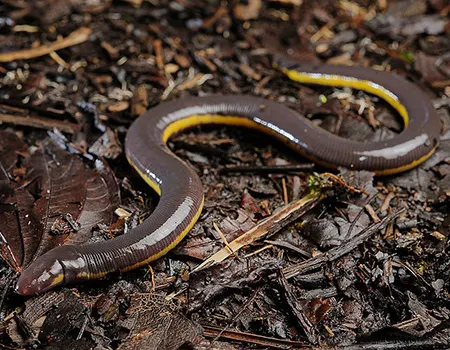
(Ichthyophis biangularis)
Metang Caecilian
It is endemic to Borneo (Malaysia): it is only known from its type locality, Mount Matang in Sarawak. It is presumed to inhabit tropical moist forests.
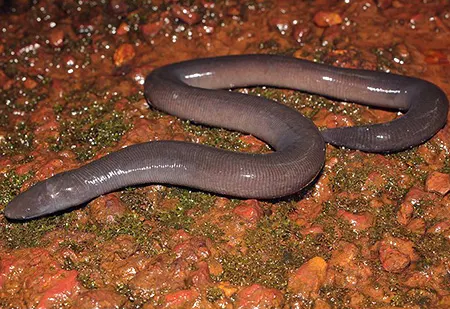
(Ichthyophis bombayensis)
Bombay Caecilian
Рибозмій бомбейський
It is found in the northern Western Ghats of India.
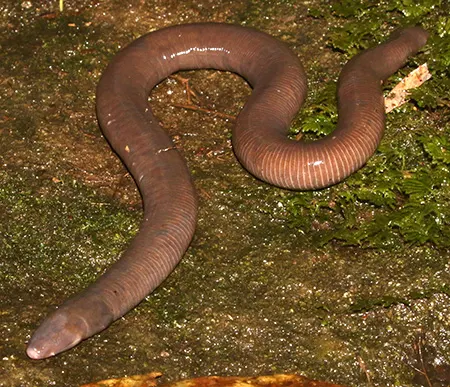
(Ichthyophis cardamomensis)
Cardamom Mountain Caecilian
It occurs in south-western Cambodia, in the Cardamom Mountains within Pursat Province, and in Preah Monivong National Park in Kampot Province, at elevations of 293–968 m. It is associated with hilly evergreen and semi-evergreen forests.
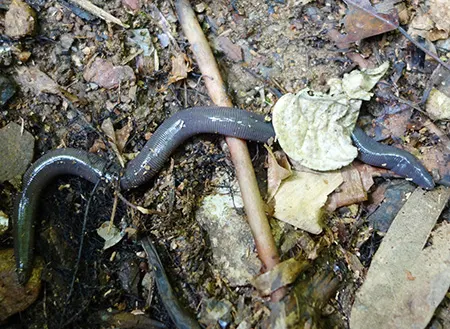
(Ichthyophis acuminatus)
Me Wang Valley Caecilian
It is endemic to Thailand. Its natural habitats are subtropical or tropical moist lowland forests, subtropical or tropical moist montane forests, rivers, intermittent rivers, plantations, rural gardens, heavily degraded former forest, irrigated land, and seasonally flooded agricultural land.
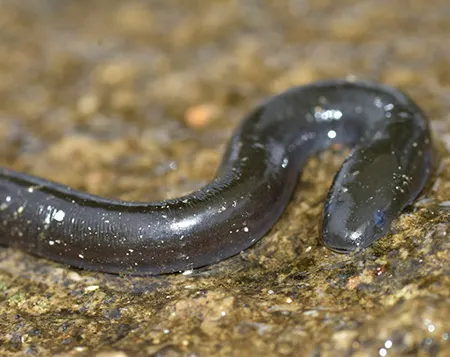
(Ichthyophis catlocensis)
Cat Loc Caecilian
It is found in Indochina.
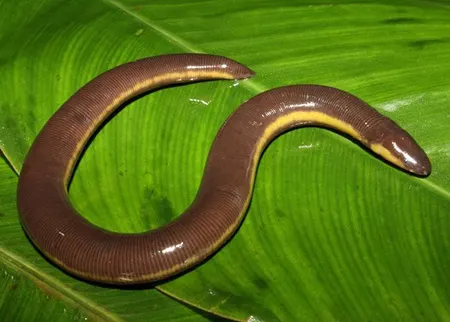
(Ichthyophis davidi)
Chorla Giant-Striped Caecilian
It is found in and around Chorla village, Khanapur Taluk, Belgaum District, Karnataka, India. This locality is within the Western Ghats, a mountain range along the west side of India.
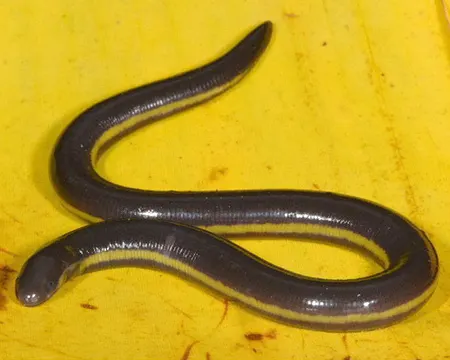
(Ichthyophis elongatus)
Elongated Caecilian
It is endemic to Sumatra. Specimens have been collected from lowland forest and from a ravine near degraded forest.
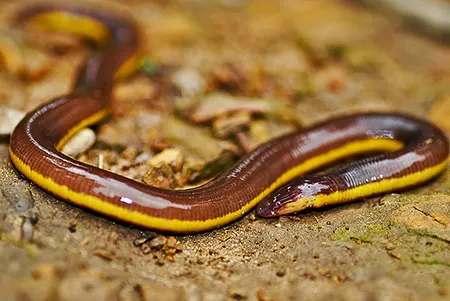
(Ichthyophis garoensis)
Garo Hills Caecilian
It is found in Assam and Meghalaya in north-eastern India as well as in Bangladesh. It is a subterranean caecilian that lives in the moist leaf-litter of tropical forests at elevations of 410–530 m.
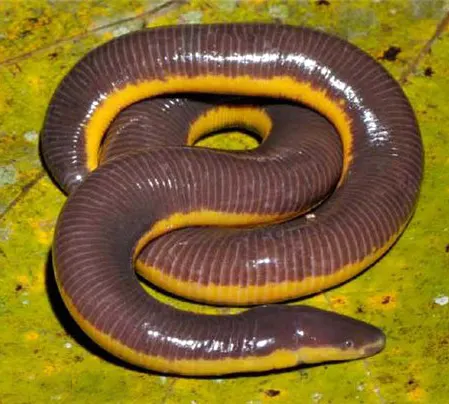
(Ichthyophis moustakius)
Manipur Moustached Caecilian
Рибозмій вусатий
It is endemic to Northeast India and has been recorded from Aziuram, Nswanram, Nriangluang, and Bamgaizaeng in Tamenglong District, Manipur, at elevations of 300–1,100 m.
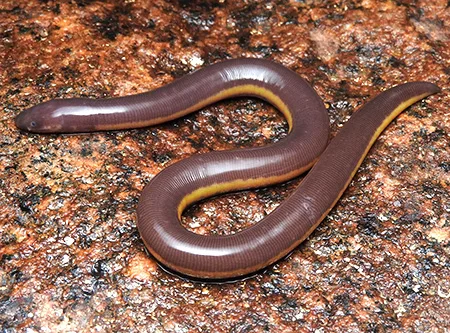
(Ichthyophis glutinosus)
Common Yellowband Caecilian
Рибозмій цейлонський
It is endemic to southwestern and central Sri Lanka. It lives in burrows in damp earth or leaf litter in subtropical or tropical moist lowland and montane forests, subtropical or tropical swamps, cleared forested areas, and pasturelands at elevations of up to 1,355 m.
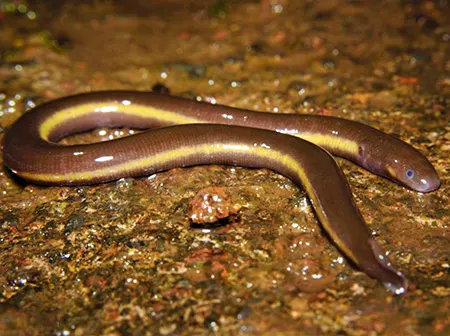
(Ichthyophis hypocyaneus)
Marsh Caecilian
Рибозмій болотний
It is found only on the island of Java, Indonesia, where it inhabits moist environments in both forested and cultivated areas, at elevations up to 100 m.
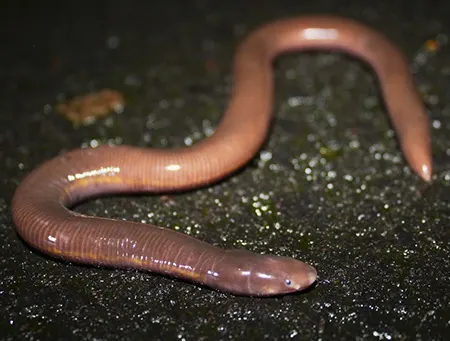
(Ichthyophis javanicus)
Javan Caecilian
Рибозмій яванський
It is endemic to Indonesia. Its natural habitats are subtropical or tropical moist lowland forests, subtropical or tropical moist montane forests, rivers, intermittent rivers, plantations, rural gardens, heavily degraded former forests, irrigated land, and seasonally flooded agricultural land.
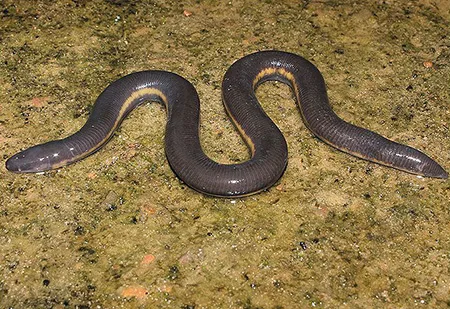
(Ichthyophis khumhzi)
Khumhzi Striped Caecilian
It has only been observed in its type locality, near the river Agoh in Manipur and Nagaland, India.
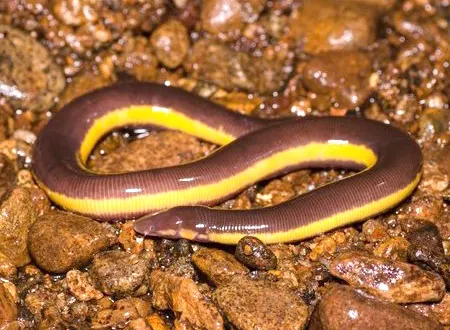
(Ichthyophis kodaguensis)
Kodagu Striped Caecilian
Рибозмій кодагу
It is endemic to the southern Western Ghats, India. The type series was collected from a mixed coffee and areca nut plantation at an elevation of 1,143 m.
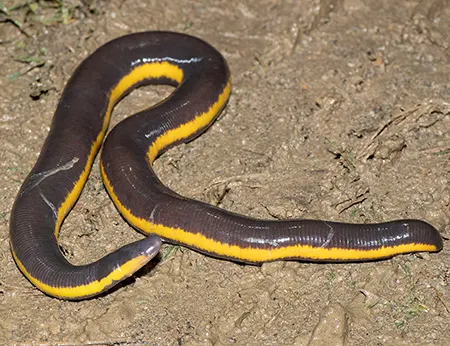
(Ichthyophis kohtaoensis)
Koh Tao Island Caecilian
It is found in Cambodia, Laos, Myanmar, Thailand, and Vietnam. Its natural habitats are subtropical or tropical moist lowland forests, subtropical or tropical moist montane forests, rivers, intermittent rivers, swamps, freshwater marshes, intermittent freshwater marshes, plantations, rural gardens, urban areas, heavily degraded former forests, irrigated land, and seasonally flooded agricultural land.
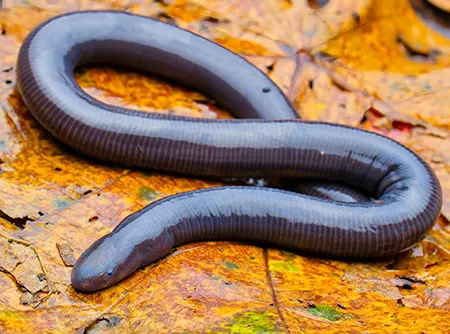
(Ichthyophis larutensis)
Larut Hills Caecilian
It is found in Malaysia and Thailand. Its natural habitats are subtropical or tropical moist lowland forests, subtropical or tropical moist montane forests, rivers, intermittent rivers, plantations, rural gardens, heavily degraded former forest, irrigated land, and seasonally flooded agricultural land.
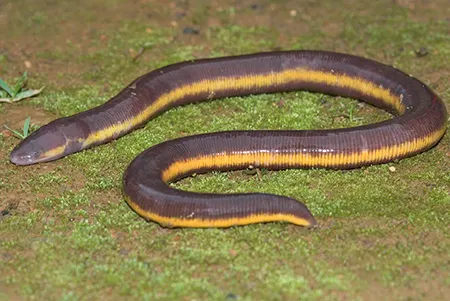
(Ichthyophis longicephalus)
Long-Headed Caecilian
Рибозмій довгоголовий
It is endemic to the Western Ghats of India, where it inhabits wet evergreen forest.
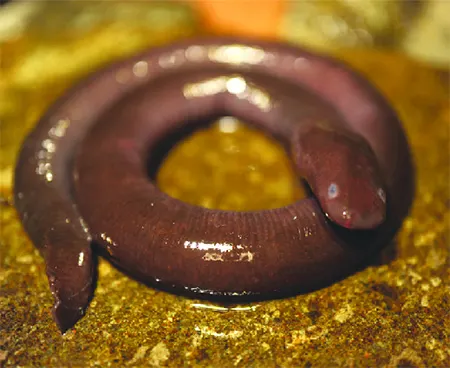
(Ichthyophis mindanaoensis)
Todaya Caecilian
Рибозмій мінданайський
It is endemic to the island of Mindanao, the Philippines. It occurs in lowland and submontane primary and secondary rainforests at elevations of 100–1,000 m. It has also been recorded in agricultural land adjacent to remnant natural forest patches.
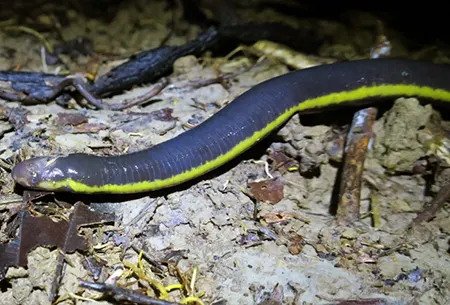
(Ichthyophis multicolor)
Colourful Caecilian
Рибозмій багатобарвний
It has only been described from 14 specimens caught in a small locality in the Ayeyarwady Region of Myanmar. The area where they were found was in an agricultural and secondary forest region, and they were collected on the surface of sandy, packed soil.
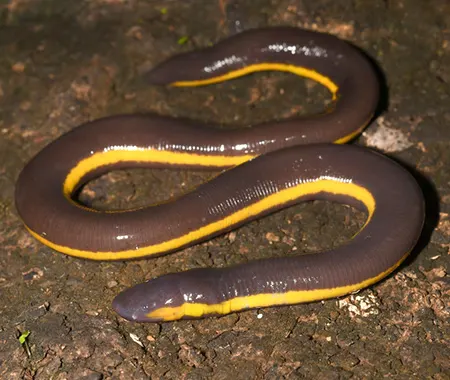
(Ichthyophis nguyenorum)
Nguyen's Caecilian
Рибозмій Нгуєна
It is endemic to certain localities of southern and central Vietnam. It inhabits seasonal tropical forests at elevations of 135–1,200 m.
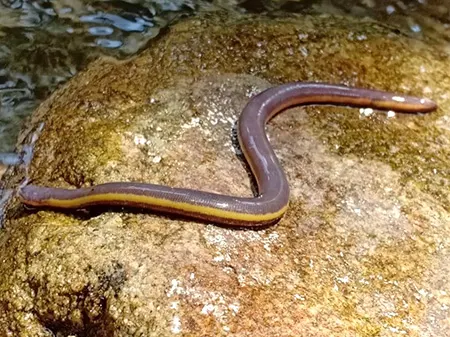
(Ichthyophis nigroflavus)
Kuala Lumpur Caecilian
Рибозмій Куала-Лумпурський
It is endemic to Malaysia. Its natural habitats are subtropical or tropical moist lowland forests, rivers, intermittent rivers, plantations, rural gardens, heavily degraded former forest, irrigated land, and seasonally flooded agricultural land.
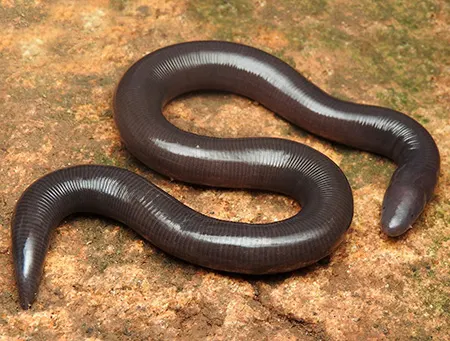
(Ichthyophis orthoplicatus)
Brown Caecilian
Рибозмій коричневий
It is endemic to Sri Lanka. It is found in a range of natural and man-made habitats including evergreen forests, rubber and tea plantations, paddy fields, rural gardens and farms, wetlands (boggy areas), and cattle pastureland.
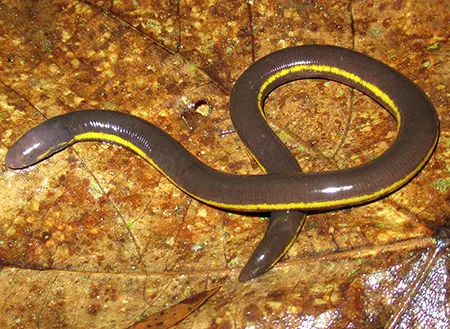
(Ichthyophis paucisulcus)
Siantar Caecilian
Рибозмій сіантарський
It is found in Indonesia and Singapore. Its natural habitats are subtropical or tropical moist lowland forests, subtropical or tropical swamps, rivers, intermittent rivers, plantations, rural gardens, heavily degraded former forests, seasonally flooded agricultural land, and canals and ditches.
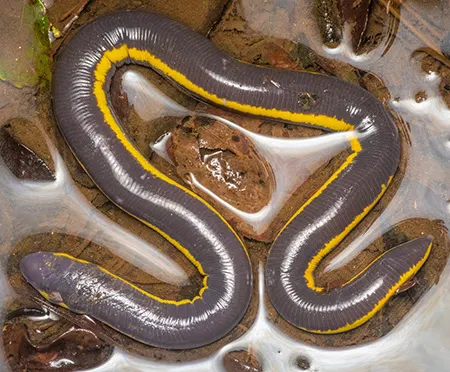
(Ichthyophis pseudangularis)
Lesser Yellowband Caecilian
Рибозмій Тейлора
It is endemic to Sri Lanka. It is found in a range of natural and man-made habitats: forests, rubber plantations, paddy fields, rural gardens and farms, wetlands (boggy and muddy areas), and pastureland.
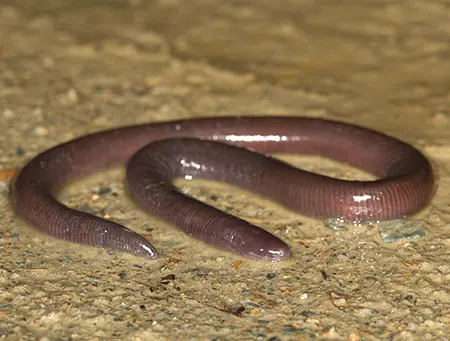
(Ichthyophis sikkimensis)
Darjeeling Caecilian
Рибозмій сіккімський
It is found in India (Sikkim and West Bengal), Nepal and possibly Bhutan.
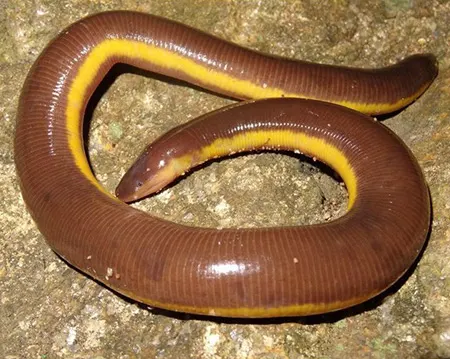
(Ichthyophis tricolor)
Three-Colored Caecilian
Рибозмій трьохкольоровий
It is endemic to the Western Ghats, India. It is a subterranean species associated with wet, semi-evergreen tropical forests, but also agricultural areas and rubber plantations. It occurs from near sea level up to 1,200 m.
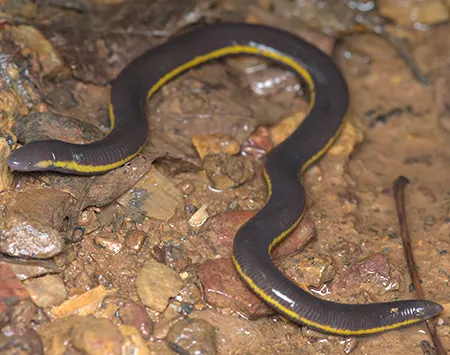
(Ichthyophis supachaii)
Nakon Si Thammarat Caecilian
It is found in Thailand’s provinces of Nakhon Si Thammarat and Trang, and possibly Malaysia.
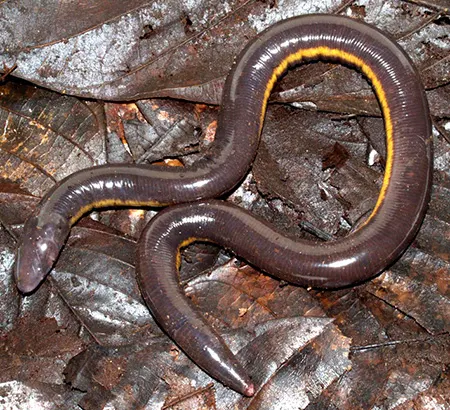
(Ichthyophis pauli)
It is known from Mount Kinabalu, Sabah, Malaysia
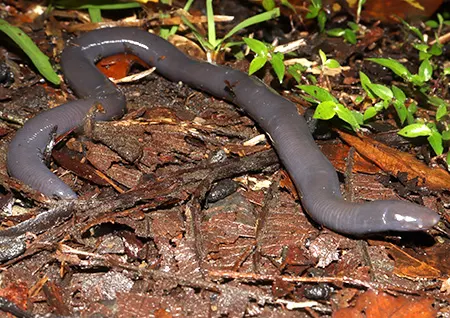
(Ichthyophis lakimi)
It is recorded from Mount Kinabalu, Sabah, Malaysia.
(Ichthyophis)
It is a genus of caecilians found in Southeast Asia, the southern Philippines, and the western Indo-Australian Archipelago.
Malatgan River Caecilian (Ichthyophis weberi), Chang Mai Caecilian (Ichthyophis youngorum), Jinping Caecilian (Ichthyophis yangi), Sumatran Caecilian (Ichthyophis sumatranus), Singapore Caecilian (Ichthyophis singaporensis), Sendenyu Striped Caecilian (Ichthyophis sendenyu), Kapahiang Caecilian (Ichthyophis paucidentulus), Nokrek’s Caecilian (Ichthyophis nokrekensis), Western Borneo Caecilian (Ichthyophis monochrous), Upper Laos Caecilian (Ichthyophis laosensis), Humphrey’s Caecilian (Ichthyophis humphreyi), Abungabung Caecilian (Ichthyophis glandulosus), Mount Dulit Caecilian (Ichthyophis dulitensis), Daribok’s Striped Caecilian (Ichthyophis daribokensis), (Ichthyophis chaloensis), Billiton Island Caecilian (Ichthyophis billitonensis), Indonesia Caecilian (Ichthyophis bernisi), Alfred’s Striped Caecilian (Ichthyophis alfredi).
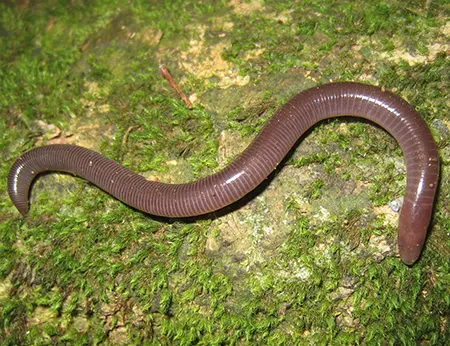
(Uraeotyphlus interruptus)
Chengalam Caecilian
Черв’яга ченгаламська
It is endemic to the Western Ghats in southern India and is only known from its type locality, Chengalam village in Kerala. Presumably, the natural habitat of this species is moist evergreen forest.
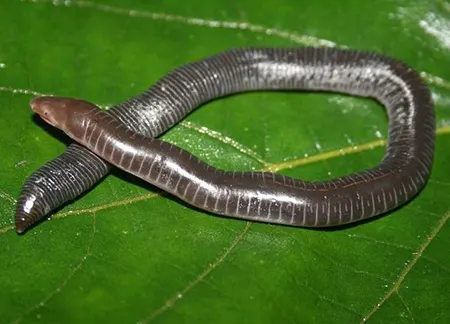
(Uraeotyphlus menoni)
Menon's Caecilian
Черв’яга Менона
It is endemic to the state of Kerala in the Western Ghats, India. It occurs in both tropical moist forest and agricultural land at elevations below 500 m.
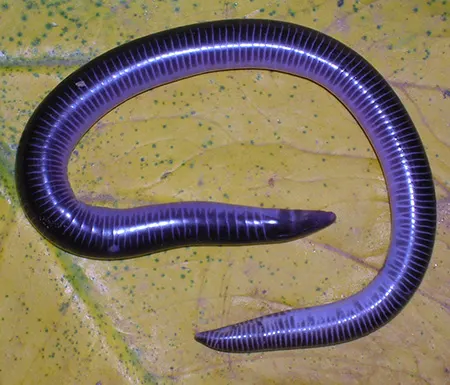
(Uraeotyphlus oxyurus)
Red Caecilian
Черв’яга червона
It is endemic to the Western Ghats in Kerala and Tamil Nadu, southern India. It has been recorded from moist evergreen forest, agricultural land, and rural gardens at elevations up to 1,500 m.
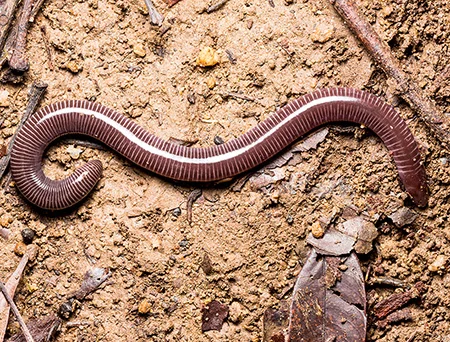
(Uraeotyphlus narayani)
Kannan Caecilian
Черв’яга Нараяни
It is endemic to the Western Ghats of India. It was described from Kottayam in Kerala, and has been reported from Karnataka.
The genus (Uraeotyphlus) also includes: Oommen’s Caecilian (Uraeotyphlus oommeni), Malabar Caecilian (Uraeotyphlus malabaricus), Gansi Caecilian (Uraeotyphlus gansi).
